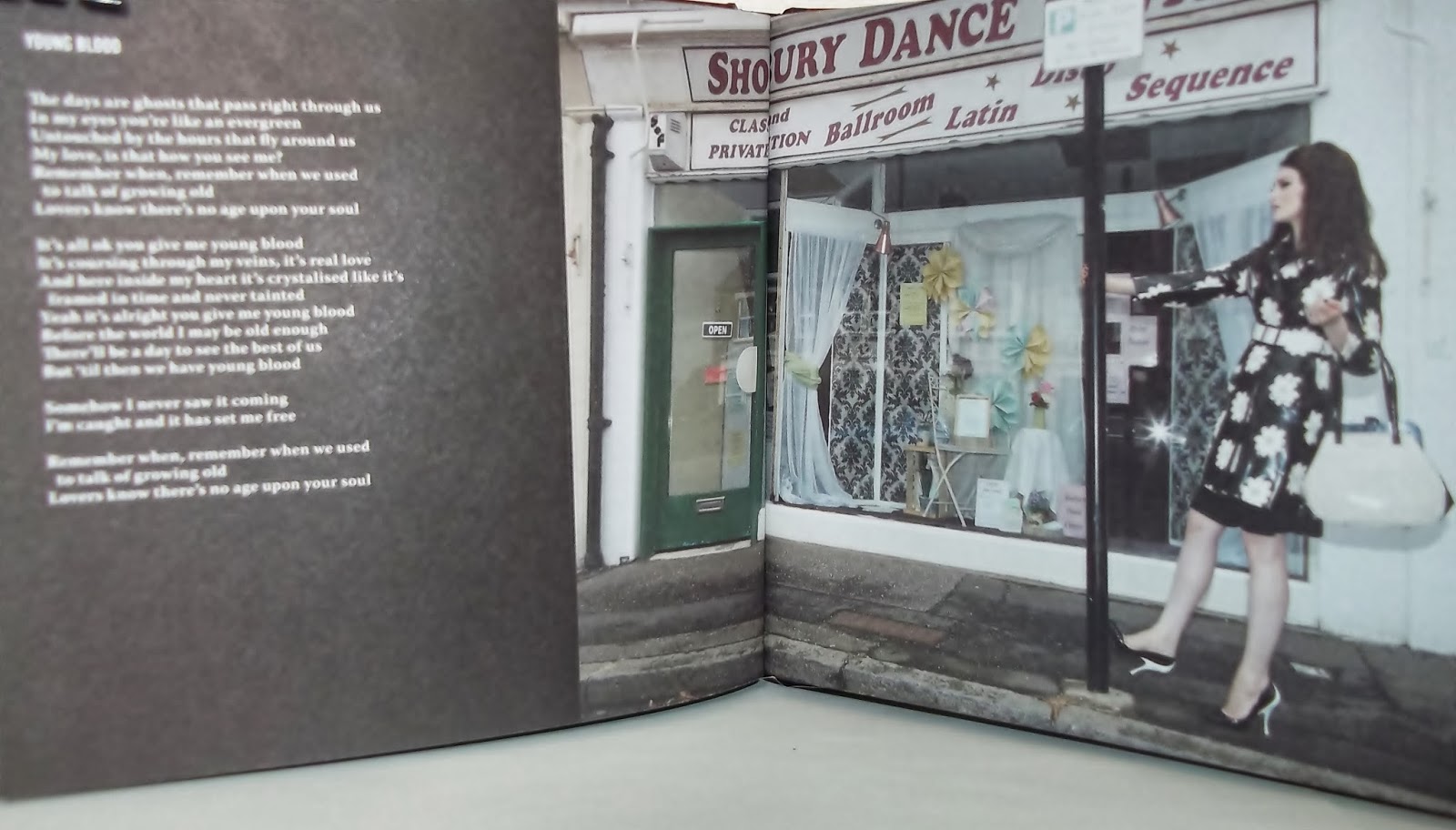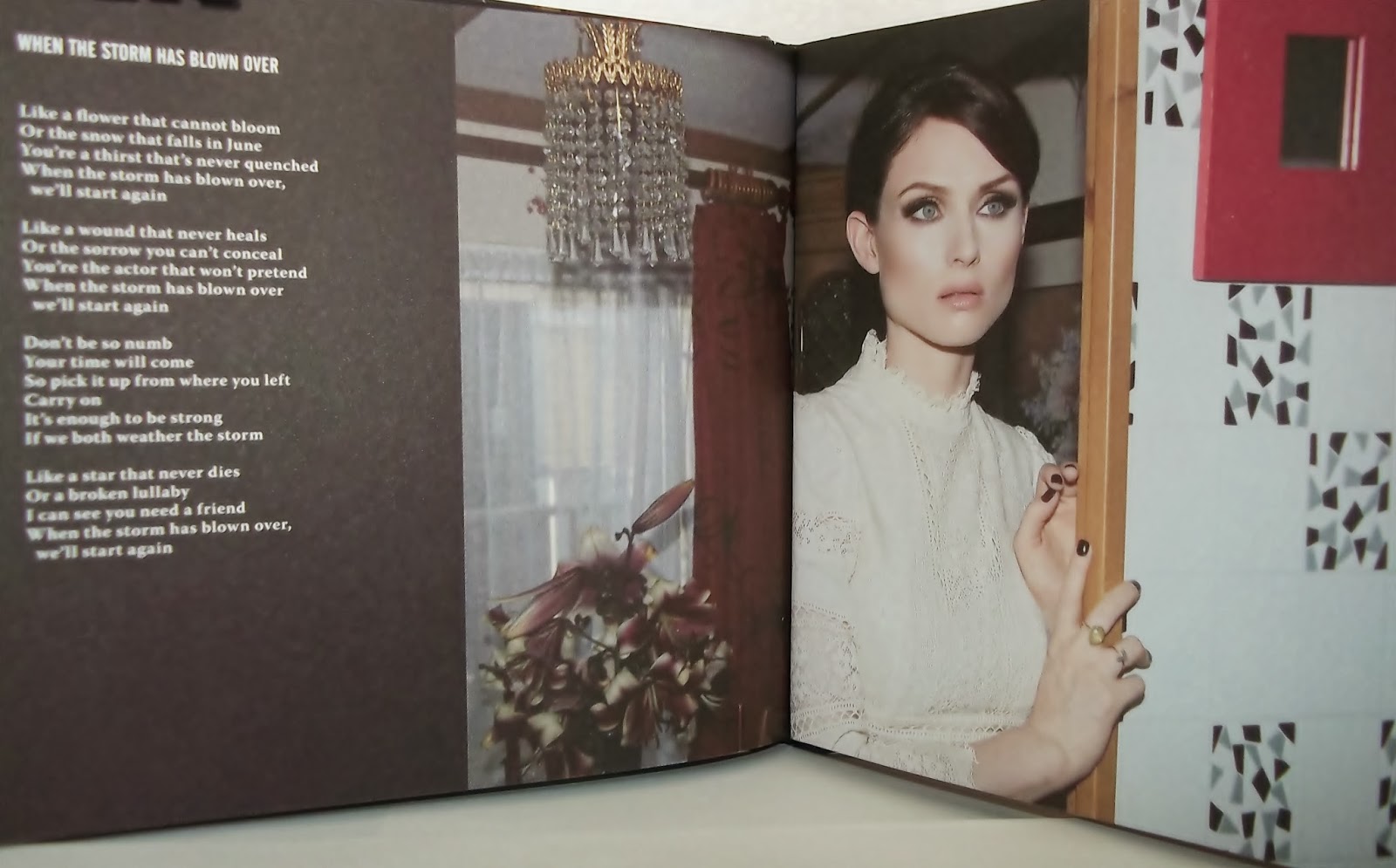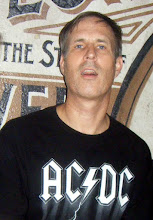The last four months of
2013 saw British pop singer
Sophie Ellis Bextor challenging herself in a most unexpected way. Those who’ve followed her decade and a half musical career had no prior indication she would star as a celebrity dance contestant on one of her home country’s most popular television shows. From
September through
December, Sophie dazzled audiences on
“Strictly Come Dancing,” reaching the final 4 from an initial grouping of 15 paired contestants.
With that achievement fully in the books, time had arrived to release of her fifth studio album
“Wanderlust” in January 2014. Co-written, produced and arranged by dark gothic singer-songwriter
Ed Harcourt, the eleven tracks has Sophie delivering on her promise to do something completely different from her previous work. In addition to his collaborative songwriting, Harcourt played all the piano, synths, organs and samples as well as pitching in on guitar, string arrangements and backing vocals too.
Richard Jones of British pop group
The Feeling (and Sophie’s spouse) played all the bass parts (unless otherwise noted), with
Seton Daunt contributing most of the guitars.
Immediate strains of Eastern European strings introduce opening track
“Birth Of An Empire.” With Cello and violin provided by sisters
Amy and
Gita Langley (who’s contributions appear throughout many of the tracks) fans of classic orchestral rock like
Led Zepplin’s “Kashmir” will find these cultural influences familiar. Over Harcourt’s piano structures, Sophie voice has never sounded better as she presents the imagery of national pride and its ever changing landscape. Every empire is initially begun through the birth of a single child. The legacy continues to grow as each successive generation strives to make their mark. The songs chorus vocals are full and majestic without sounding artificial. An impressive instrumental break commences as the string section, deep tom toms and familiar bass patterns come together, providing a timely bridge. Background vocals are actually placed in front of the lines “break through the web that I have spun” and “it doesn’t matter where you are when I am gone.” These vocals become even more creative on the songs outro where military style snare drumming leads into the more fluid chorus. “The pull of where you’re from is far too strong” becomes the central takeaway message.
“Until The Stars Collide” delivers on the promised live-in-the-studio feel from the advance video blogs taken during these recording sessions and shared with her fans over the past year. This is particularly noticeable in the straight forward drumming, driving harpsichord and start-stop tandem bass guitar /drum accents. “Fiction is all I’m holding on to” completes an overall literary metaphor of books used to describe an important relationship. While a clever musical reference is made to Sophie’s earlier works as the song pivots on chorus ending words “moving on.” There is a slightly warped presence to guitar chords strummed on the “everybody knows” bridge, creating a floating sensation. The title itself is sung with an angelic sheen around it, as if calling to the ghost of
Emily Dickinson.
“Runaway Daydreamer” continues the emphasis on middle eastern string sections, before settling on a single electric pianos. There Sophie presents a tale of personal musing against this unencumbered musical backdrop. Live-in-the-studio drums return before the massive vocal hook emerges. Here the multilayered vocals reveal creative design, using proper recording studio techniques for the best possible results. A playful nod to the
Temptations (and
Rolling Stones cover of)
“Just My Imagination” (running away with me) emerges. Having previously composed and recorded a song called
“Me and My Imagination” on
2007’s
“Trip The Light Fantastic,” a historical depth emerges from this returned to theme. The joys of a “secret escape” are extolled, sharing a theme that approaches
“The Secret Life of Walter Mitty” territory.
“The Deer And The Wolf” introduce guitar as the dominant instrument, with a strong riff providing forward momentum. This track also appears to have developed out of the full band playing together, as opposed to a producer meticulously assembling looped passages. This throwback style of recording where the band is all playing together has delivered refreshingly natural sounding results. Of particular note is deep pocket driving bass guitar, especially on the bridge. The songs subject matter deals with how opposite forces in this life need each other for universal balance. Catchy sing-along hooks emerge on both the “Come away come away darling” bridge as well as the “On and on and on my love” chorus.
Centrally located in the tracklist order comes the first song (and first single) initially revealed from this collection, the beautiful and unfeigned
“Young Blood.” With an active piano melody leading the way, percussionist
Phil Wilkinson plays soft jazzy brush strokes on snare drum over
Amy Langley’s deep Cello notes. The orchestral feel is completed through
Arnulf Lindner’s Double Bass contributions. All of this provides the necessary sonic environment for Sophie’s lovely, heartfelt vocals. These lyrics reference how a part of you still sees the person you love as the way they originally were when you first met them. The passage of time does not really change any of that. An inquisitive question is then posed “is that how you see me?” Subtle lyrical details come in to focus, as first bridge line “Remember when” initially uses “we were the diamonds in the coal” in place of “we used to talk of growing old.” While on the melodic and thoroughly addictive chorus, the word ‘take’ replaces ‘see’ on the turnaround line “There’ll be a day to take the best of us.”
_______
Like something from a jazzy, wistful theatrical show,
“Interlude” has a charmingly vintage feel to its overall production. The percussion is scratchy and lo-fi, with a dreamlike sheen enveloping the grouped-in-threes waltz timesignature. “I forget why it was” (not ‘what I was’) echoing and toying in her mind as she heads home.
Opening synth pulses chime out like a newscast bulletin on the brilliant
“13 Little Dolls.” As light tom-tom percussion provides bouncy undercurrent, bright organ pierces through with tonal quality reminiscent of Sophie’s first band
‘theaudience.’ A quintessential ‘counting’ song, Sophie recites out the numbers one through thirteen with energetic charm. When listening to the count-up on headphones, the left/right panning creates a pleasurable tickling sensation in your ear. Lyrical references to ‘witches’ and ‘spirits’ place the story firmly in the
Grimm fairytale mode. The psyched-out instrumental break pits distorted growling guitar against heavy tom-tom drumming and a buoyant bass pattern. Heavy guitar chords on the end out add power and punch to an already great rock song.
Employing the obvious talents of
“Dirty Pretty Strings” (
Gita, Rosie and
Amy Langley, plus
Polly Wiltshire on Viola),
“Wrong Side Of The Sun” presents an extravagantly ornate mood. Strummed acoustic guitar and piano chords over a propulsive bassline soon follow in the verses as a tale of dramatic loss is told. Lyrically poetic, the vivid imagery of wishing to be a prophet and then rising phoenix exist as desire to let love grow. Praying for rain to “calm down the flames” prove futile however, as “fates weren’t on our side.” The Sun’s healing power is a theme Sophie favors, though here it is viewed from the other side. Sonically, the creative use of background voices on the bridge finds Sophie trading off with herself in a series of angelic “ahhhhhs.”
A return to the 1-2-3 waltz timesignature leads the way into the playfully twisted fable
“Love Is A Camera.” Sharing a spiritual kinship with the likes of
Bertolt Brecht and
Kurt Weill’s “Threepenny Opera,” the literal use of camera imagery as imprisonment device is both clever and more than a bit macabre. Plucked-string harpsichord is used as a basis for this
Renaissance/Baroque music piece, accurately setting the overall mood.
Arnulf Lindner once again adds double (upright) bass, keeping the chamber music feel intact. Like every other song on this record, a wonderful hook emerges via the sweepingly grand “Stand still evermore, Pose for eternity with me” chorus. The image held in a tomblike monument (“centograph”) fulfills its owners need. The song’s final minute finds the pace quickening as a nursery rhyme chant repeats to fadeout.
Built upon the marching percussive representation of horse hooves,
“Cry To The Beat Of The Band” presents lyrical imagery referencing “the heart of winter” and “snow falling down.” As with so much of this album, dramatic strings provide instrumental accompaniment, now further enhanced by an appearance from the world-renowned
Bulgarian Choir. Sophie steps out in front of all this to deliver one more big hooky chorus, which neatly delivers the song title. Here dynamic accents emerge by way of drop down bass notes, a buzzy brass tone and boldly fundamental percussion. The story is centered around a bride who runs away on her wedding day because she couldn’t follow through on this “deceitful love.” Musical changes arrive unexpectedly, like the instrumental break featuring live-in-the-studio drumming that follows bridge lyrics “heavy is the head that wears the veil.” It’s at these moments one is once again reminded of those inside-look recording session video snippets. You could hear how Sophie and her core band kept a natural feel to the making of these songs. The proper balance has been struck between a live style environment and studio enhancements like backing vocal choirs.
The album closes with
“When The Storm Has Blown Over,” a gentle, introspective ballad that is accompanied by soft electric guitar and little else. The aftermath of conflict provides an opportunity for the willing to “start again.”
Get
Wanderlust from
iTunes Here
or at
Amazon Here
This review is also available on the
Web at
My Social List Here
All things Sophie can be found here:
http://sophieellisbextor.net/
Previous features on this site about Sophie:
Make A Scene - detailed Album Review
Sophie - live in New York - June 2010
Sophie - Exclusive Interview - June 2010
* * * * *
A cursory listen to
“Boy Cried Wolf,” the latest album from Britpop band
The Feeling might seem initially like a collection of piano ballads from singer and lyricist Dan Gillespie-Sells. Additional plays however, reveal a myriad of rich and textured instrumental passages. These contributions from all five band members place emphasis firmly on the transformative power of words and music combined.
Scheduled for release on
February 18, 2014 through
BMG Chrysalis, this innovative worldwide deal for recording and publishing is a first for the band. It’s been a long journey back to the states for the group, who initially played an intimate
New York show at
The Mercury Lounge in 2006, followed by a bigger tour in
2007. Bearing witness to one particular performance at
Webster Hall in April of that year showed just how dynamic their live show can be.
The album kicks off with
“Blue Murder,” using distant conversational voices to create a cinematic feel. Piano, guitar and bass lead the way with vocals presented in a confessional manner, speaking both to a personal as well as universally relatable heartbreak. When the full band comes in on the word “cries” (as in “everybody cries blue murder”), it hits with a force that lifts the emotive power that much higher. Thematic title embedded within these lyrics, the recognition that we all at one time or another “cry wolf” becomes cathartic. “If I keep my head when others scream and shout – maybe I’ll forget my sorrows as they drown me out” shows a desire to rise above it. The band shakes things up on the outro with some particularly edgy guitar bursts from
Kevin Jeremiah.
“I fear mirrors and lights – it’s been a long day,” is but one self-conscious reveal on follow-up track
“Anchor.” “I’m scared of looking behind, because we’ve come such a long way” and “holding on to a dream, you’re going to make it” may be as much of a testament to the bands history and present collective determination, than simply an ode to lost love. With the chorus invoking song title and thematic metaphor for stability (anchor) now removed - the untethered relationship is free to “sail another shore,” as touches of a traditional gospel arrangement emerge. Subsequent verses add
Beatle-esque background vocals, which soften an otherwise somber point of view.
The joyously uptempo earworm single
“Rescue” (seriously, try to get it out of your head after only one or two listens) is about as perfectly constructed pop song one could ever reasonably hope for. Emotional isolation is now met with a plea for help from other, because “sometimes I get lonely.” Those lyrics provide the full band its first opportunity for emphatic sonic punctuation on the word “lonely.” What immediately follows is an even bigger hook, with the lyrics “oh, oh, oh I never thought that it would be this hard – to find love.” Further revealing lyrics like “give me the will to sing again” points to those moments of self-doubt where one questions the very thing that made them who they are. Adding brass horns on the dominant hook applies a
Beatles-circa-Sgt. Pepper sheen to it all. Those horns follow along on the “I really messed it up my friend” change. Other delightful sonic details can be found in a singular tambourine placed dead center in the stereo field, running through each chorus. The song culminates with an explosive blast of the word “yeah!” that delivers a tumultuous release.
“Falls Like Rains” asks if you’ll “be a saint” as “this boy needs a lick of paint” and how “all the years begin to show” pointing out that even relatively young people can feel this way. It seems that a mere 7 to 10 year cycle can trigger these concerns. With track title and overall theme speaking to the renewing power that simple rain provides to earth and seed, the hum-along hook comes by way of a mere “oh, oh-oh, oh-oh” refrain. “What was broken can be made like new” is the takeaway message of hope and redemption. The band steps out in a shining moment of instrumental bliss with keyboardist
Ciaran taking a star turn of cascading piano notes that accurately recreate the musical equivalent of falling rain. The rock solid rhythm section of
Paul Stewart and
Richard Jones punch the accent notes, and well – “do that thing that they do.”
“A Lost Home” channels the spirit of
Elton’s “Don’t Let The Sun Go Down On Me” through piano focused ballad storytelling. What’s apparent about Dan Sells appeal is his ability to write a song that is both intensely personal (“don’t look at me like that”) yet easy to relate to as it speaks to common human experiences (the ‘house vs home’ principle). The band emerges harnessing a brilliant accompaniment style reminiscent of
Nigel Olsson and
Dee Murray’s contributions to the aforementioned Mr. John early trio days, with a touch of
Nick Mason/Roger Waters/David Gilmour Pink Floyd sprawl.
The under two minute
“Hides In Your Heart” approaches near
Billy Joel territory with jazz inflected piano figures, while “The Gloves Are Off” uses a boxing metaphor for romantic relationships. Busy piano structures and percussive cymbals lay the groundwork, while sinuous guitar lines emerge over bridges. The dramatic instrumental interlude gives way to an ultimately gentle fade-out.
“You’ll See” has acoustic guitar leading the way this time. There’s fearlessness here, as references to God and a rawness of emotions reveal how damaging loves “games” can be. Like nearly every other song on this album, there is a grand instrumental ending, this time enhanced by a vocal choir.
“Empty Restaurant” explores further avenues of loneliness and the crippling effect of love lost. Using an echo repeat effect on the vocal lines effectively reflects “talking all alone just to hear yourself.” The introduction of sequenced percussion patterns creates a unique undercurrent to further vocal orchestral enhancements.
“When I Look Above” opens with the sound of people’s conversations, adding an element of mystery to it all. A young boy emerges with the statement “when I look above I do not long for gods in heaven, I long for open hearts and eyes that judge on actions alone.” That statement becomes the central theme of wide eyed hope and acceptance. Of being able to “sing my song” and not caring about who else sings along. Of living life without the fear of something missing and not longing for “things I’ll never own.”
Final track
“I Just Do” benefits from a studio master mix, expanding upon an “Acoustic live at The Doghouse” version originally given as a free download last summer. Where that track suggested elements of
Pink Floyd “Dark Side Of The Moon” grandiosity within its compositional structure, this studio version leaves little doubt that
“The Great Gig In The Sky” served at least partially as inspiration. Prominent throughout also are
Kevin’s elongated guitar lines, which one could imagine
David Gilmour giving a nod of recognition to. Then there are the lyrics, which show strength in the honesty of saying that “I wish I DIDN’T feel the way I do,” but – “I just do.” When
Dan asks “tell me are you gonna be my friend? Because I don’t need another one of them,” it perfectly captures the need to still connect, cautioned by one too many experiences with duplicity. A “throw me in the swim” bridge and subsequent stark piano passages move the track back over into
Elton John territory, before a full on march to the finish line. Once there the spirit of
The Beatles “Hey Jude” emerges via background “Ahhhhh’s” and an “I Want You To Know It” repeated vocal refrain. That joyous lift captures the same vibe as Jude’s “Na Na Na Na’s.”
The band has indicated on numerous recent occasions that a return to America for a series of shows is in the works. One would expect New York to figure most prominently in these plans.
This review can also be found on
My Social List,
Here
For all things
The Feeling, go Here
http://www.thefeeling.com/
* * * * *

































